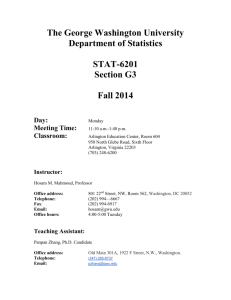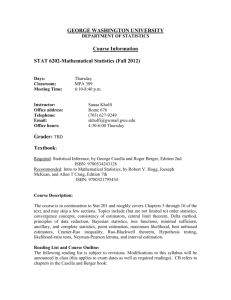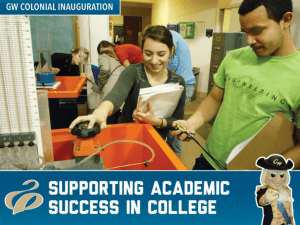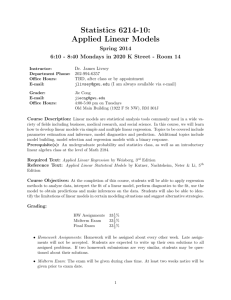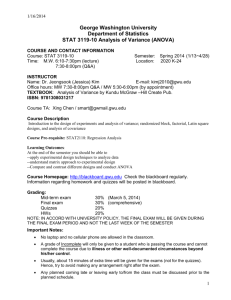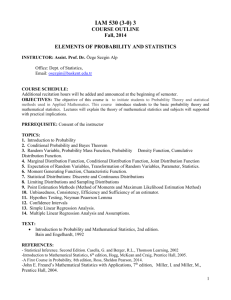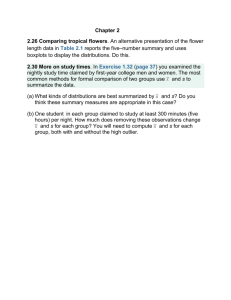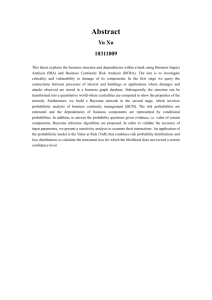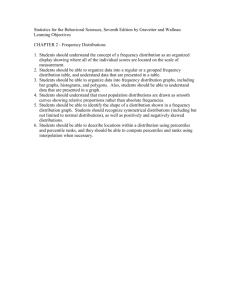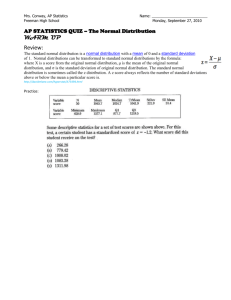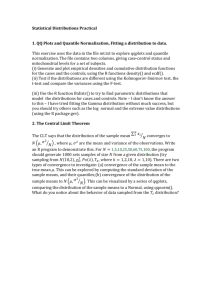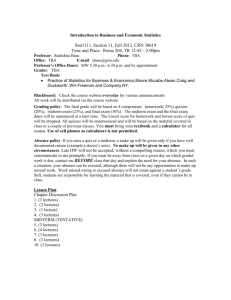STAT 6201-12 - The Department of Statistics | The George
advertisement
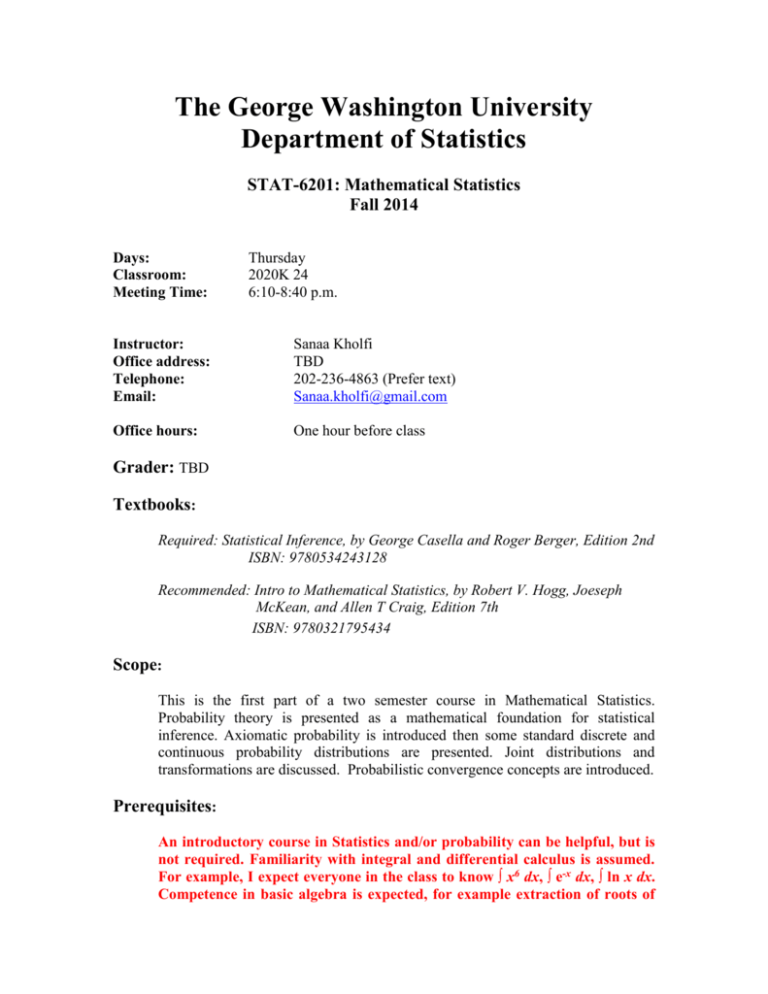
The George Washington University Department of Statistics STAT-6201: Mathematical Statistics Fall 2014 Days: Classroom: Meeting Time: Thursday 2020K 24 6:10-8:40 p.m. Instructor: Office address: Telephone: Email: Sanaa Kholfi TBD 202-236-4863 (Prefer text) Sanaa.kholfi@gmail.com Office hours: One hour before class Grader: TBD Textbooks: Required: Statistical Inference, by George Casella and Roger Berger, Edition 2nd ISBN: 9780534243128 Recommended: Intro to Mathematical Statistics, by Robert V. Hogg, Joeseph McKean, and Allen T Craig, Edition 7th ISBN: 9780321795434 Scope: This is the first part of a two semester course in Mathematical Statistics. Probability theory is presented as a mathematical foundation for statistical inference. Axiomatic probability is introduced then some standard discrete and continuous probability distributions are presented. Joint distributions and transformations are discussed. Probabilistic convergence concepts are introduced. Prerequisites: An introductory course in Statistics and/or probability can be helpful, but is not required. Familiarity with integral and differential calculus is assumed. For example, I expect everyone in the class to know ∫ x6 dx, ∫ e-x dx, ∫ ln x dx. Competence in basic algebra is expected, for example extraction of roots of equations of the second and third degree and accurate manipulation of algebraic expressions are assumed to be in your background. Topics: 8/28/2014 9/4/2014 9/11/2014 9/18/2014 9/25/2014 10/2/2014 10/9/2014 10/16/2014 10/23/2014 10/30/2014 Week 1 Week 2 Week 3 Week 4 Week 5 Week 6 Week 7 Week 8 Week 9 Week 10 11/6/2014 Week 11 11/13/2014 Week 12 11/20/2014 Week 13 11/27/2014 Week 14 12/4/2014 Week 15 12/11/2014 Week 16 Introduction to statistics and probability, axioms Combinatorial probability, Bayes’ rule Conditional probability, independence, random variables Quiz 1, discrete distributions Functions of random variables, expectation MIDTERM Moment generating function, Continuous distributions Continuous distributions Probability inequalities., Joint distributions Bivariate transformations, mixtures Quiz 2, covariance, correlation, multivariate distributions, problems Sums of independent random variables The sampling distribution No Class Order statistics, convergence, central limit theorem (time permitting) Final Exam Learning outcomes As a result of completing this course, students will be able to: 1. Make probabilistic arguments. 2. Formulate probabilistic models for science, engineering, economics, public policy and many other areas of application. 3. Have a global overview of the interplay between probability and statistics. Grading Policy 1 Midterm (25%) 1 Final (35%) 2 Quizzes (10%) Homeworks (30%) Note that these add up to a total of 100 percentage points. Final grade will be based on: Final Semester Score = (30*HW + 10*Q+25*M + 35*F)/100, where HW is the homework average, Q is the quiz score, M is the midterm score, and F is the final exam score (each out of 100). Grades will be assigned on the +/scale Here is an example of what constitutes an A grade in this class. You score 95% or above: all homeworks and tests are solid and well done. You can miss a couple of problems here and there and still get an A. NOTE: IN ACCORD WITH UNIVERSITY POLICY, THE FINAL EXAM WILL BE GIVEN DURING THE FINAL EXAM PERIOD AND NOT THE LAST WEEK OF THE SEMESTER Class Policy Late work: Will not be accepted. Make-up exams: Except for medical cases (with proper documentation), there will absolutely be no make-ups, you missed an exam, you failed it. Homework: You should feel free to discuss problems with your fellow students (please document on each assignment with whom you worked). However, you must write your own solutions, and copying homework from another student (past or present) is forbidden. The GWCode will apply to all assignments, both in and out of class. Blackboard Please check Blackboard frequently, as there may be assignments, announcements, and material passed to the class via this electronic medium during the week. You can find it at http://blackboard.gwu.edu/webapps/portal/frameset.jsp You need to login, using your GW user ID and password. For university policies on teaching, see http://www.gwu.edu/~academic/Teaching/main.htm Academic Integrity I support the GW Code of Academic Integrity. It states: “Academic dishonesty is defined as cheating of any kind, including misrepresenting one's own work, taking credit for the work of others without crediting them and without appropriate authorization, and the fabrication of information.” For the remainder of the code, see: http://www.gwu.edu/~ntegrity/code.html Any case of the slightest hint of cheating will be prosecuted to the fullest extent of the university Academic Integrity Policy. You will receive an automatic F, and the case will be taken to the proper administrative channels. Support for students outside the classroom DISABILITY SUPPORT SERVICES (DSS) Any student who may need an accommodation based on the potential impact of a disability should contact the Disability Support Services office at 202-994-8250 in the Marvin Center, Suite 242, to establish eligibility and to coordinate reasonable accommodations. For additional information please refer to: http://gwired.gwu.edu/dss/ UNIVERSITY COUNSELING CENTER (UCC) 202-994-5300 The University Counseling Center (UCC) offers 24/7 assistance and referral to address students' personal, social, career, and study skills problems. Services for students include: crisis and emergency mental health consultations confidential assessment, counseling services (individual and small group), and referrals See http://gwired.gwu.edu/counsel/CounselingServices/AcademicSupportServices Security In the case of an emergency, if at all possible, the class should shelter in place. If the building that the class is in is affected, follow the evacuation procedures for the building. After evacuation, seek shelter at a predetermined rendezvous location.
